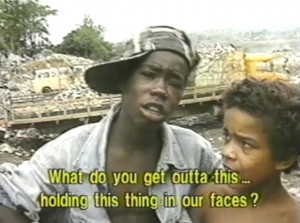Poetic injustice. The terrible irony of it. On the same day, the news that the US actor Philip Seymour Hoffman has died from a heroine overdose, and the veteran Brazilian filmmaker Eduardo Coutinho, has been stabbed to death by his son, who is reported to suffer from schizophrenia. (According to a BBC report, the police told a press conference that the son ‘knocked on a neighbour’s door after the attack saying he had “liberated his father”.’) I learn about the first from the mass media, the second from Facebook, in posts from Latin American friends and colleagues, who over the next few hours register a huge outpouring of shock and grief, for Coutinho was well known and much loved. In Latin America, that is, because Coutinho was a documentarist. Still active at the age of 80, his work was little known elsewhere. The more’s the pity, because he was one of the most original of contemporary filmmakers in any field.

I met him on just a few occasions and was captured by his good humour and gentle spirit. You can see this in his appearances in his own films, and has much to do with their integrity, because he always showed his subjects the respect that they merited as individuals—a respect that as a friend puts it, was always removed from the paternalism and earnestness with which Latin American filmmakers so often film the popular classes. He was also keenly, and in some of his last films, increasingly aware of the paradoxes of the performativity he drew out of them.
A post from Ecuador captures the deep humanity of his work in a passage taken from the introduction to a newly published book about him:
“Coutinho’s is an essential cinema that captures the truth of the encounter between a film crew and different characters, in the most direct manner imaginable, without resorting to tricks or deploying big technical resources. What’s important for Coutinho is the permanent, the invariable and common between people, even if it’s subjective and singular. Few filmmakers have his ability to watch people so intimately; and few like him, capable of listening and catching people’s depth through the word. This is because cinema for Coutinho is an oral medium, a cinema of the spoken word with all its variations—the truth and the lie within it, the wealth of accents and slang; the word which turns into song, the word that emerges from silence and inevitably ends up returning to it, the word which harbours subtexts between the lines of a good conversation. Without doubt, we owe to Coutinho the most complex and poignant portrait of the popular and middle classes of Brazil over the last few decades.”
As a tribute, here’s a piece I wrote about him a few years ago.
Eduardo Coutinho and the spirit of documentary
